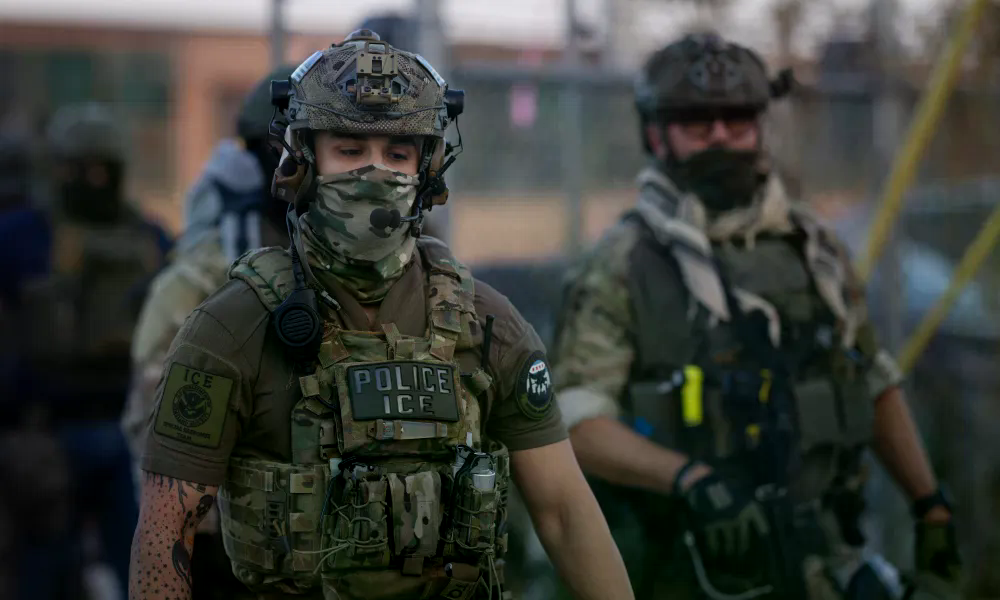
Two immigrants currently detained in Chicago, Illinois, have filed a class-action lawsuit against senior officials at the United States Department of Homeland Security (DHS), alleging that they were denied access to legal counsel and subjected to “inhumane and unlawful” treatment.
The American Civil Liberties Union (ACLU), a U.S. civil rights organization, announced the emergency lawsuit on Friday. The case highlights deteriorating conditions at the Immigration and Customs Enforcement (ICE) facility in Broadview, a Chicago suburb, since the start of President Donald Trump’s immigration enforcement initiatives earlier this year.
“Everyone, no matter their legal status, has the right to access counsel and to not be subject to horrific and inhumane conditions,” said Alexa Van Brunt, director of the MacArthur Justice Center’s Illinois office and lead counsel for the lawsuit. “Community members are being kidnapped off the streets, packed in hold cells, denied food, medical care, and basic necessities, and forced to sign away their legal rights.”
The plaintiffs, Pablo Moreno Gonzalez and Felipe Agustin Zamacona, are Mexican immigrants who have lived in the United States for over 30 years. Both are currently held at the Broadview facility. Their lawsuit names senior Trump administration officials, including Homeland Security Secretary Kristi Noem and ICE Director Todd Lyons, as defendants.
This is the latest in a series of lawsuits alleging abusive conditions and neglect within immigration detention facilities. In August, a similar class-action suit was filed against the Trump administration concerning a detention center in New York City.
The current complaint focuses specifically on the Broadview facility, which serves as the primary processing site for ICE in the Chicago area. Lawyers for the plaintiffs argue that the number of detainees exceeds the facility’s capacity to safely accommodate them.
According to data cited in the lawsuit, nearly 5,202 individuals were held at Broadview between January and July of this year. At any given time, at least 200 people are detained there. However, the numbers have surged since the launch of Operation Midway Blitz on September 8, a campaign led by Secretary Noem and the Department of Homeland Security to increase immigration arrests in the Chicago region.
The lawsuit claims that the increased pressure has strained the facility, which was originally intended for short-term detention but is now used for extended stays. “ICE officers have even held eight women in an isolation room designed for a single person for at least a day,” the lawsuit alleges.
Conditions inside the facility have reportedly worsened, with reports of overcrowding forcing detainees to stand in cramped spaces and lack of room to lie down. The lawsuit also describes rooms with bodily fluids on the walls, overflowing toilets, and infestations of cockroaches and centipedes.
An anonymous detainee quoted in the lawsuit stated, “We told the guards that the place was at full capacity, but they kept bringing people inside. They treated us like animals, or worse than animals, because no one treats their pets like that.”
The lawsuit further asserts that detainees have been denied adequate food, water, hygiene, and medical care. While some are allowed brief access to a cellphone or landline to contact legal representation or family, these conversations occur in a central area where federal officers can overhear them.
Some detainees have been completely cut off from outside communication, and lawyers and religious representatives have been barred from entering the facility. The lawsuit also claims that members of Congress have been prevented from accessing the site.
“We can debate immigration policy, but there is no debating the denial of legal rights and holding those detained in conditions that are not only unlawful but inhumane,” said Nate Eimer, a partner at the law firm Eimer Stahl and co-counsel for the lawsuit.
The Trump administration has consistently denied allegations of abuse in ICE facilities. However, Operation Midway Blitz has drawn significant scrutiny since its inception, as reports of mistreatment continue to emerge.
Advocates have criticized the operation, often conducted by armed, masked agents, for allegedly exhibiting a “pattern of extreme brutality.” Recent incidents include the deployment of tear gas near a neighborhood Halloween parade, where children were present.


